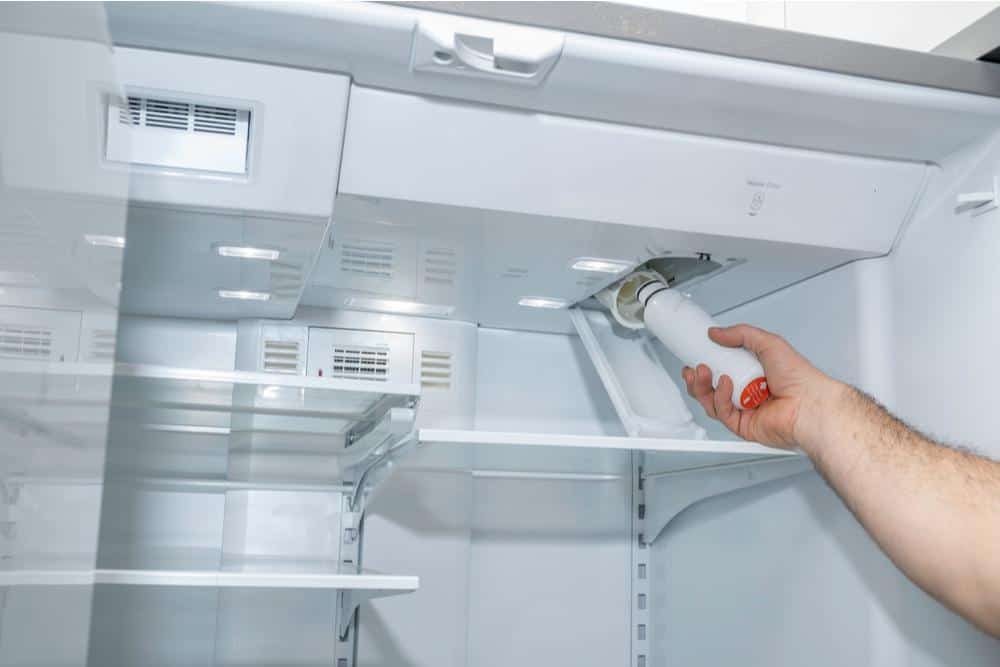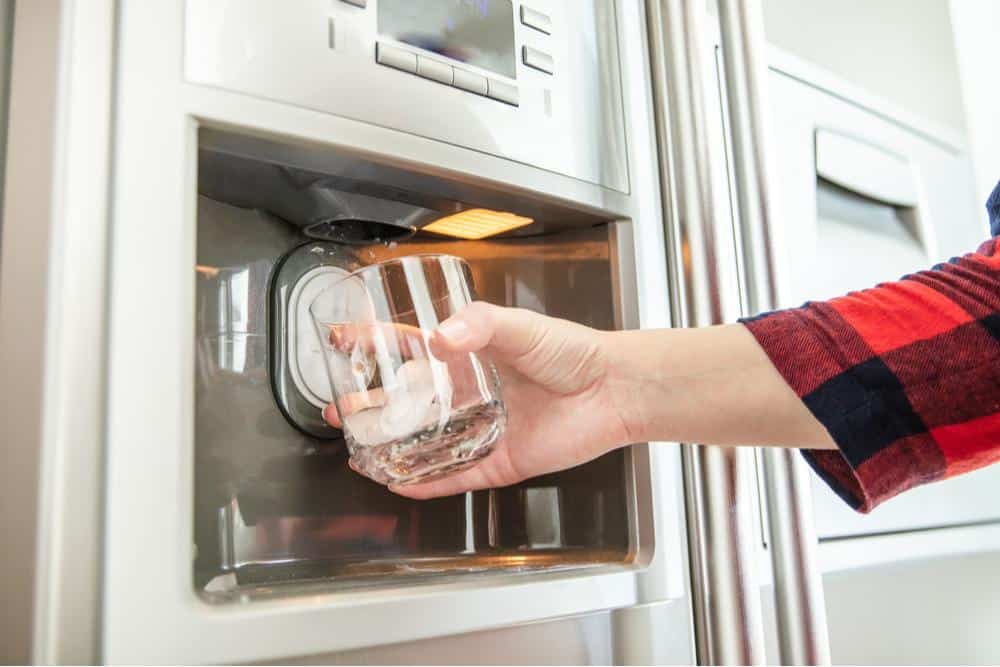You might have heard of fluoride, the chemical additive in most municipal water systems. Fluoridated water increases enamel health and bone thickness. Water fluoridation is the process of raising the fluoride concentration in municipal water from its very low naturally occurring levels (around .1 to .2 ppm) levels up to .7 ppm (parts per million).
The problem is not everyone wants their fluoride level to be quite that high. If you have a fridge with a water feature, you might be wondering-is there fluoride in that water too, or just in the tap water?
Well, the answer might be a little more complicated than you think. It depends on your fridge filter, house location, and whether your fridge is connected to city water or an independent source. However, there are ways to determine the answers to these questions and whether your fridge water has fluoride.
The short answer is that it depends on where you live. If you live in an area with fluoride added to the water, your fridge likely has fluoride in it. Unless you have a reverse osmosis filter in your refrigerator or you have an alternative water source, your ridge provides the same water as your kitchen tap, only slightly more filtered.

The odds are that fridge filter doesn’t act as a fluoride filter
The filters on a standard refrigerator are generally strong enough to get harmful contaminants out of the water, such as bacteria and impurities. Most refrigerator filters are carbon filters, which weed out multiple kinds of bacteria and dirt in the water.
Although carbon filters are useful and protect your water from several dangerous chemicals, there are a few things that they won’t be able to filter out. One of these is fluoride, which was put in the water by the government to prevent tooth decay in American citizens.
However, not all water sources contain fluoride. Those who aren’t on city water don’t need a filter strong enough for fluoride because they won’t have it added to their water. Even folks who live in the city and get their water from an independent source, such as a well, might not have access to fluoride.
Although anyone who doesn’t get city water won’t have fluoride in their fridge water, they might have issues with cavities and tooth decay later in life. The bottom line is that whether or not your fridge water has fluoride depends more on where you live than your fridge filter.
Fluoride is a byproduct of the chemical fluorine, which is the most reactive chemical element. While it is toxic in its standard form, fluorine leaves a non-toxic residue when combined with certain elements and chemicals. This residue is fluoride.
Fluoride has been added to the waters in many American cities for over fifty years. Its chemical makeup causes it to strengthen bones and enamel. Since the widespread implementation of fluoride, dentists have seen fewer cavities in the United States.

Fluoride is essential for healthy teeth - especially for children
Fluoride is legally required by some cities and states. But it is not added to all the water in the country. Well, water and non-city water often do not have fluoride added. Ultra-purified water, like spring water, bottled water, and distilled water, all undergo a fluoride removal process.
Fluoride is an excellent source of bone strength and additives that occur naturally in the human body. Many people choose not to drink city water or use fluoridated toothpaste. It does prevent cavities and increases the strength of your enamel.
However, too much fluoride can cause health problems as well. According to the CDC, the proper amount of fluoride is contained in city water and regular amounts of tooth brushing. The water plants and filtering systems that the U.S. government regulates add the proper amount of fluoride to water.
There are two ways to check if your fridge water has fluoride in it. The first way is to check if your city or local ordinances require added fluoride. If you live in the United States, most larger cities are required to add fluoride to their water. However, the decision is up to each municipality.
You can look on your local city or county website to find this. Generally, they will have the fluoride regulations listed under local laws and ordinances. If your city or county mandates fluoride treatment, your refrigerator water is most likely fluorinated.
However, some fridge filters reduce the chemicals and bacteria in the water. Every fridge that supplies water has a filter, but few are strong enough to filter out the added fluoride.
The second step to check if your fridge water is fluorinated is to see what kind of filter you have. The only type of filter that can remove fluoride from water is a reverse osmosis filter, which doesn’t come with most brands of refrigerators.
You likely have a refrigerator water filter that came with your refrigerator. Although very few refrigerators come with anything more robust than a carbon filter. A refrigerator water filter uses activated carbon within the filter to remove some contaminants and pollutants that may be present within your tap water.
For more advanced water treatment that delivers pristine drinking water, your refrigerator filter isn't going to cut it. You can install a reverse osmosis based water filtration system. A reverse osmosis water filter will remove fluoride and many other water contaminants and heavy metals. You're left with extremely pure water.
To understand reverse osmosis, you should know about osmosis first. Osmosis happens when two separate liquids flow down a pipe with a filter between them. The two liquids combine to form a mixture.

A reverse osmosis filter, acts as an effective fluoride water filter
Reverse osmosis is exactly the opposite. In this scenario, a single liquid is forced through a pipe. There is a filter down the middle, just like in osmosis.
In reverse osmosis, the liquid is forced through the tunnel. The filter is a fine mesh, more fine depending on what’s filtered out. Eventually, the liquid separates into two separate substances.
If your reverse osmosis system is in a refrigerator, the two substances being separated are pure water and everything else in the water. A carbon filter can get most of the chemicals out, but if you want pure water without fluoride or anything else, reverse osmosis is the only way to do it.
Fortunately, these filters are available and easy to install into refrigerators. More expensive reverse osmosis filters separate salt from seawater, making it drinkable. However, you can buy a reverse osmosis filter that fits your refrigerator and use it for your regular water supply.
Although a healthy amount of fluoride is excellent for oral hygiene and longevity, too much of the chemical can have the opposite effect. If there is too much fluoride in your water source, your bones and teeth will start to calcify and get too stiff.
Early signs of fluoride overuse include white spots on the teeth. This spotting doesn’t have any adverse health effects. If it continues to the bones, the calcification will cause stiffness and brittle bones, which can crack more easily.
While the health benefits outweigh the risks of fluoride, it’s essential to not consume too much. Fortunately, there is a legal limit for fluoride in drinking water. The government regulates water for this reason- to protect its citizens from dangers.
Although government regulation isn’t always perfect, you can get reports of fluoride levels in your area. You will likely receive an alert if the fluoride levels are too high for consumption, and you will need to drink bottled or reverse osmosis filtered water until the levels are lower.
If you have a reverse osmosis filter in your refrigerator, there’s no need to worry about water levels in your area. This filter will give you the highest amount of filtration outside a distillation plant. You will be able to get pure water with nothing else added.
